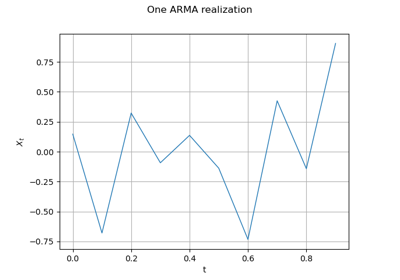ARMAState¶
- class ARMAState(*args)¶
Last state recorded of an ARMA process.
- Parameters:
Examples
Define a state of an
process of dimension 1:
>>> import openturns as ot >>> myLastValues = ot.Sample([[0.6], [0.7], [0.3], [0.2]]) >>> myLastNoiseValues = ot.Sample([[1.2], [1.8]]) >>> myARMAState = ot.ARMAState(myLastValues, myLastNoiseValues)
Methods
Accessor to the object's name.
Accessor to the dimension of coefficients in the list.
Accessor to the last values of the noise defining the ARMA process.
getName()Accessor to the object's name.
getX()Accessor to the last values of the ARMA process.
hasName()Test if the object is named.
setName(name)Accessor to the object's name.
setXEpsilon(x, epsilon)Accessor to the last values of the noise defining the ARMA process.
- __init__(*args)¶
- getClassName()¶
Accessor to the object’s name.
- Returns:
- class_namestr
The object class name (object.__class__.__name__).
- getDimension()¶
Accessor to the dimension of coefficients in the list.
- Returns:
- dimensionint
The dimension
of the ARMA process.
- getEpsilon()¶
Accessor to the last values of the noise defining the ARMA process.
- Returns:
- noises
Sampleof sizeand dimension
Last
values of the white noise of the
process of dimension
.
- noises
- getName()¶
Accessor to the object’s name.
- Returns:
- namestr
The name of the object.
- getX()¶
Accessor to the last values of the ARMA process.
- Returns:
- values
Sampleof sizeand dimension
Last
values of the
process of dimension
.
- values
- hasName()¶
Test if the object is named.
- Returns:
- hasNamebool
True if the name is not empty.
- setName(name)¶
Accessor to the object’s name.
- Parameters:
- namestr
The name of the object.
 OpenTURNS
OpenTURNS
